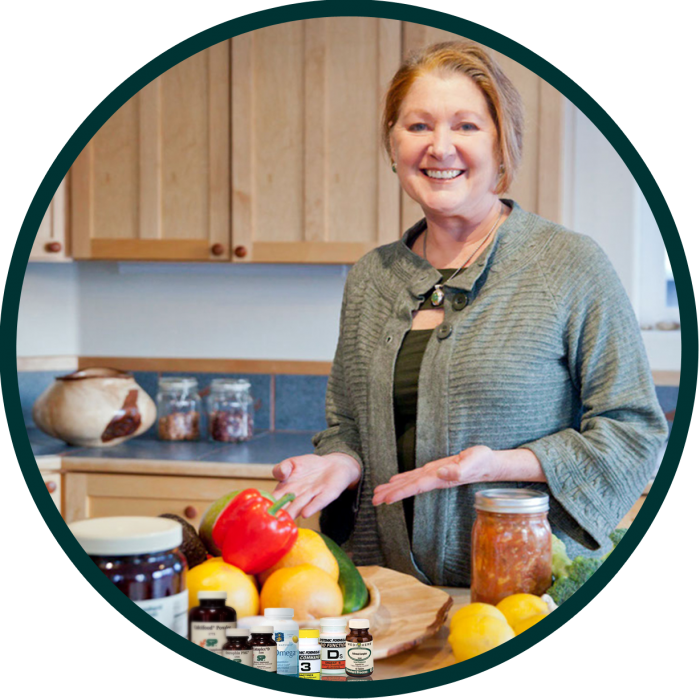My decision to design my own individual, food as medicine, healthy lifestyle stemmed from personal health struggles. A lifetime of Lyme disease (not diagnosed until I was 52) that impacted my ability to compete athletically and a dairy sensitivity causing chronic back pain (that I assigned to a rollover car accident and two broken vertebra) led me to take action with my own nutritional habits.
It worked. At 60, I have been in remission from Lyme for at least 8 years; for nearly 11 years my back pain has been non-existent. I can do all the things I want to do.
These experiences, combined with my passion for helping people, developed my pure fascination for food as medicine. My enthusiasm is directed to guiding clients to meet their own nutritional needs, fitness goals, and improving confidence in themselves—and to get the word out about what is possible.
Today, the prevailing focus is on calories—food as a source of energy. When we focus on calories, we ignore the need for genuine building blocks to run the body well. If we skip a nutritious meal so we can have pizza and ice cream, there is a negative effect on our health. Sure, we can have a “cheat meal”. Does cheat day, cheat month, cheat decade help you feel well and accomplish what you’d like?
With your vehicle, you take it in for an oil and filter change—this is different from filling the gas tank. This is maintenance to keep your vehicle running. Our bodies also have to filter and change toxic waste. To do so, we need B vitamins, anti-oxidants, proteins—a very long list of nutrients. We aren’t getting those if we consume processed foods.
Food is information
Even more fascinating is how food can transform and change genetic expression.
The root derivation of “information” is “to put form into.” No cell in your body makes the exact same things at the same time, day in and day out. Hormones cycle hourly, daily, monthly, annually. In a chronically inflamed person, hormones that coordinate the immune system change when we carry too much body fat. These hormones push up our blood pressure, imbalance our ability manage blood sugar, that pushes up our cholesterol if accumulated toxic waste didn’t already.
Symptoms are your body’s way of saying “pay attention, please”—we’re imbalanced.
We also get fixated on having the right amount of a certain nutrient but nutrients don’t work in isolation—you can have too much of one relative to too little of another. Vitamins, minerals, proteins, fats, carbohydrates work in balance. I’ll never forget my meeting with the FDA and another with the head of the (newly founded) NIH Complementary and Alternative Health research arm. In these meetings, I was told that good science changes one thing at a time and looks to see if there is an effect. That’s not true: In the 1960’s, Harley-Davidson developed mathematical ways of analyzing multiple influences to determine which change cause the largest effect when all are changing. Sadly, this sophisticated use of math was rejected by the U.S. industries so the statistician took it to Japan where Honda, Toyota, and others rapidly adopted it and became synonymous with reliability for decades. This is how the body works.
Anything can cause anything, and everything is connected to everything.
In nutrition, if you change only one nutrient or diet, or focus on “x” amount of “y”, you are missing out on real health. We are all different. What worked for “aunt Alice” (at 15 mg/day) may or may not work for you.
Having a “right” amount, or “right” way is dogmatic. It’s easy to get fixated on getting to ketosis, or eating like a carnivore, or vegan, or raw food… Ask: how do you feel your best? What habits work for you?
Also—and this is vital—ask: What did you remove from your routine as part of following a certain plan? By definition, a ketogenic diet removes three highly inflammatory foods: sugar, cereal grains, and dairy (eggs are poultry). What you removed could explain why you feel better and are enjoying weight loss rather than the dietary strategy itself.
Body – Mind – Spirit.
I work with all. If you choose to follow a vegan philosophy for philosophical or spiritual reasons, let’s do so in a way that helps you feel well. If you choose “Paleo”, low-carb, or even keto/Atkins, let’s tweak that to ensure you feel well.
If you don’t feel well, let’s find what nutrients are missing and support those needs; let’s find what is irritating your body (especially your digestive tract) and fix that.
Balance.
We need to nourish our bodies to feel well mentally and spiritually. It’s no fun dragging around a body that is unhealthy and limits what our soul would love to do.
Sadly, psychiatry prefers to label states of emotional turmoil and prescribe medications. It’s not that the symptoms, or even the turmoil, aren’t there. Ask: Do the labels help? We should use caution with labels so we don’t send a person down the path of “I’ve this genetic predisposition” or “fetal alcohol syndrome” or “ADD” or “my parents were obese—I have the obese gene” … “therefore, I’m just going to be this way”.
And the new label on the block is “orthorexia” which means an obsession with proper or ‘healthful’ eating. Although not an official diagnosis, a psychiatry website explains it as eliminating “major food groups” and lists sugar, processed foods, meat, dairy, and gluten.
Question: If eliminating gluten helps your child with their autoimmune Eczema, would you do it?
Question: If each time I have dairy my back goes out and I can’t enjoy skiing, running, or even sitting reading a book… would I prefer my latte’s over that?
Question: If cane or corn sugar sends blood pressure out the roof and increases the need for insulin, wouldn’t it be OK to skip it?
Question: If those yellow cheese crackers made from processed grain products, oxidized (rancid) polyunsaturated vegetable oil, synthetic vitamins, and diary from cows fed modified feed including hormones and glyphosate (RoundUp); if eating these makes my son go zany, am I a psychiatric case for choosing to make my own? Or skip buying them?
We are being overwhelmed by marketing and confusing nutrition messages. Sure, if making healthy diet and lifestyle choices interferes to the extent it becomes a barrier to living then doing so is a problem.
Likewise, if going along with current food marketing and labels interferes with feeling well enough to enjoy life and living, then that is equally a problem.
Food as inflammation
Certain food choices can tell us to gain weight or shift our (and our children’s) immune system toward asthma, allergies, or autoimmunity.
Likewise, certain food choices communicate health and well being at very deep layers of our wiring—down to telling immune cells whether the environment is safe, whether or not to make energy, whether or not to conceive a baby.
In clinical trials, the Standard American Diet (SAD) is treated not just as a “risk factor’, it is considered a cause of lethal disease. A risk factor slightly changes your likelihood of developing disease; a cause means you are almost guaranteed to develop the disease.
Within PubMed.gov (the Library of Congress’ repository of scientific literature), there are nearly 20,000 citations exploring nutrients like vitamin D, omega-3 fats, curcumin, plant anti-oxidants… as a way to lessen the deadliness of the SAD diet.
Yet—we have such a difficult time ignoring the Big Food and Big Pharma marketing. Change is hard, change causes stress. I get that. Does opening the door to a health solution improve quality of life?
Wall Street mainstays of wheat, corn, pork, sugar, Kellogg, etc. spend billions annually not just on marketing, but also lobbying “official” nutrition recommendations. Then Big Pharma manufacture pharmaceuticals to suppress the symptoms of nutrient insufficiency and/or anti-food caused inflammation, high blood pressure, blood sugar imbalances, and more. Next, we pay more than any other country on the planet for “health” insurance to cover the costs of sickness care. It’s a very effective business model when more people make a living off cancer than die from it—and that isn’t due to high recovery rates.
Something can be done about it
First off is knowledge: Consider the addition of folic acid to fortify grain-based breads and other products. This is a synthetic form of B9—one of the B vitamins used alongside other B vitamins, magnesium, zinc, selenium, for numerous biochemical needs throughout the body. The name of this B vitamin “folate” is derived from foliage, green leafy vegetables, which we don’t eat often enough. Turns out, the synthetic B9 may be training synthetic pathways that are not particularly good for us (especially methylation—and especially in people who have a genetic MTHFR variant). These altered pathways can cause anxiety, depression, high blood pressure, and numerous other problems.
Another example is vitamin E: There are naturally eight different vitamin E types. In whole foods, the form is primarily gamma tocopherol. In over-the-counter supplements, the form is d-alpha or—worse—dl-alpha which is made from petroleum. The whole foods gamma tocopherol is far more effective than alpha at improving cardiovascular health ( which is mainly a problem of the SAD diet).
As a science geek in research and development, even I used to marginalize the difference between whole food and synthetic supplements—after all, we’re just a bunch of water, fat, some amino acids, a few vitamins and minerals… Now, I spend just as much time helping my clients balance their health by exploring what happens when we consume real food.
And that includes balancing the digestive tract in key ways so it absorbs nutrients, not compounds that are the aftermath of inflammation:
- Remove “filler foods” that tend to cause inflammation: All cereal grains (wheat, corn, oats, rice, barley, rye) and milk / milk products. Make these quick breads and muffins that use alternate flours.
- Replace “filler foods” with plants: Both root vegetables and above-ground parts including fruit have fibers that help the body eliminate cholesterol and toxic chemicals. These also improve the gut microbiome and provide whole foods versions of nutrients. Explore these recipes.
- Replace “filler foods” with non-grass seeds: beans, chia seeds, sesame seeds, quinoa, amaranth, buckwheat, nuts… View the body as a relationship between each organ and the microbiome that co-exists with you. These seeds improve gut health as long as you prepare your beans properly.
- Consume high quality fats like olive oil, coconut oil, avocado oils—please never cook with polyunsaturated fats.
- Ensure you get enough quality protein—your digestive tract lives on proteins.
- Call me 907-222-1824 before you grab those over-the-counter supplements. I use carefully vetted whole food, herbal, and homeopathic remedies that are the same as nature intended.
Let’s design your unique clinical nutrition program. You’ll be amazed at how good you’ll feel.


Leave a Reply
You must be logged in to post a comment.